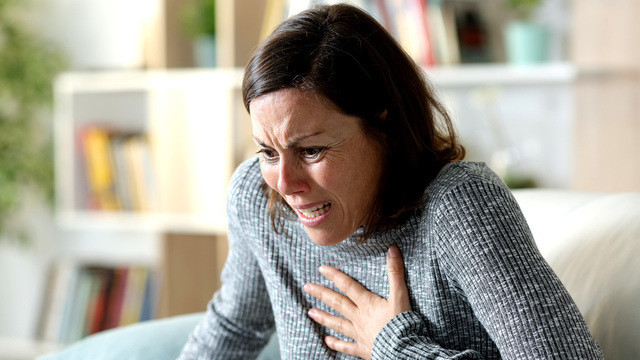It seems that the usual reality is bursting at the seams, we are disturbed by disturbing thoughts– all this provokes the occurrence of nervous disorders and panic attacks. Together with emergency doctor Maria Kovalchuk, we figure out how you can help yourself in such a difficult time for the psyche.
 84762
84762
We lose control of ourselves when we have a panic attack. But it is important to understand that this condition can be dealt with, because it does not pose a physical threat to a person. It is important to learn to pull yourself together and slowly return to normal life.

Panic Attackis a sudden onset of intense fear that causes severe physical reactions. There is usually no real danger or obvious reason. When you have panic attacks, you might think you're having a heart attack or even dying.
Mayo Clinic
 Image: Sabelskaya/Depositphotos
Image: Sabelskaya/Depositphotos
1. Breathe properly
At the first sign of a panic attack, it is important to focus on your breathing. Inhalations and exhalations should be conscious, long, deep. Deep breathing helps ease the response to stress and anxiety. Different breathing techniques can be used:
-
Diaphragmatic breathing, in which the abdominal wall should rise on inhalation and fall on exhalation.
-
Simply slow breathing. It is better to inhale through the nose and exhale through the mouth. Straighten your shoulders and back.
-
Using counting. You need to inhale and exhale, each time counting to four. It's good if you can focus on counting and breathing.
-
With breath holding. If inhalations and exhalations become frequent, superficial, you can hold your breath after inhalation for a few seconds. This will help you breathe slower, deeper.
2. Find a quiet place
During an attack, it is better to find a calm, quiet place where there will be fewer people. It is desirable that you can sit there, relax until normal health is restored. A separate room, foyer or study will do. You can just go outside and sit on a bench. You need to take a comfortable position, try to relax. It is recommended to use meditation or relaxation techniques. This will help to cope with anxiety.
If there is nowhere to go, you can just close your eyes for a while and focus on your breathing. The method helps especially well if the attack begins due to the fact that a person finds himself in a crowd, in a moving vehicle, at a holiday.
4. Imagine something nice
You can cope with fear and anxiety by imagining something pleasant, safe, associated with positive emotions. It can be a place where a person feels comfortable, a beloved animal, someone close. The main thing is that the image evokes positive emotions and helps to calm down.
Read all about panic attacks and the fight against them on the MedPortal.
Read article
5. Tighten and relax your muscles
To relieve an attack, you can use the simplest muscle relaxation technique: for example, alternately strain and relax individual muscle groups. It can be the muscles of the back, arms, legs, abdomen. Tension and subsequent relaxation helps to control the state of the muscles, focus on it, distracting from anxiety and fear. Such exercises help you learn to quickly distinguish between tense and relaxed muscles, recognizing the approach of a panic attack.
6. Remember that the attack will end soon
After a few minutes, a strong fear will let you go. You can repeat to yourself that fear is only caused by a panic attack, that this condition does not need to be controlled, that it will quickly pass by itself. This will help get rid of the fear of death and the feeling of impending danger.
7. Control your health
A panic attack can feel like a heart attack or suffocation. It is necessary to be examined by a doctor, to monitor the state of health, so as not to confuse a panic attack with symptoms of a dangerous condition. If such episodes happen regularly, tell your therapist about them, describe how you feel during them. This will help you understand if the symptoms are really related to stress, anxiety, or they have another reason. Regular diagnosis and health care help reduce anxiety.
8. Focus on the sensations
Often, seizures are accompanied by a feeling of unreality of what is happening, a feeling of isolation, detachment, loss of control. The ability to focus will help to cope with this. You need to focus on familiar sensations: for example, the texture of the fabric under your fingers or the tactile sensations when you feel the keys. By focusing on them, you can distract yourself from the anxiety that provokes an attack in order to maintain control over the situation.
To make it easier to focus on sensations, you can carry a special object with you for this: for example, a key chain, a pen, or any other small , a familiar subject. If a panic attack begins at a time when there is nothing suitable at hand, you can focus on any subject, note all its features to yourself. It can be a clock on the wall, a tree on the street, a parked car, a view from the window: any object that will help switch attention.
